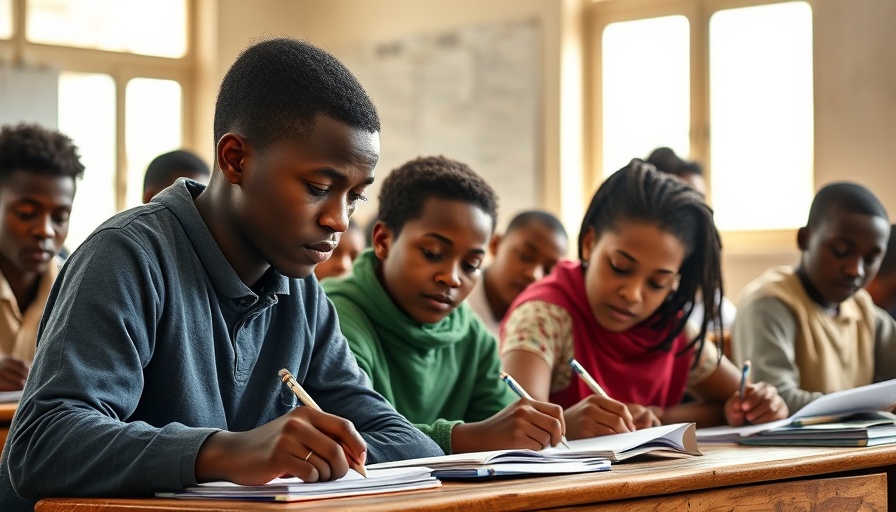
Transforming Education in Africa: Actionable Commitments for a Brighter Future
The call for enhanced education is resonating louder than ever across the African continent. As the African Union declared 2024 as "The Year of Education," it marked a pivotal moment for African nations to advance their commitments toward quality education for all, highlighting the significance of educational access as the cornerstone of progress and development. But how do we transition from mere commitments to real, lasting change that nurtures future generations?
Innovative Programs Poised to Revolutionize Learning
Aligned with this mission, the recently approved program, Advancing Innovative Methods to Promote Learning (AIM4Learning), is set to benefit over 70 million children in Eastern and Southern Africa. The initiative harnesses cutting-edge technologies and innovative educational frameworks to improve both the quality of education and school enrollment rates. Crucially, AIM4Learning emphasizes reducing the number of out-of-school children, particularly focusing on ensuring equal access for girls to secondary education.
This innovative approach is not just a loose promise; it echoes a historical commitment to education that has seen the World Bank allocate more than $7 billion specifically for education financing across the region last decade. This funding aimed at addressing systemic challenges has laid the groundwork for transformative initiatives that have started to take shape.
A Glimpse at Success Stories Across Africa
Countries like Rwanda and Ethiopia exemplify the path forward by successfully implementing education reforms that other nations can emulate. In Rwanda, government initiatives to enhance teacher effectiveness—through improved salaries, performance evaluations, and classroom infrastructure—have significantly reduced learning poverty. In the Democratic Republic of Congo, removing school fees has enabled millions of children to receive primary education, showcasing an actionable step towards eliminating barriers to education.
Moreover, Ethiopia's shift towards a play-based curriculum has resulted in an impressive 88% transition rate to Grade 2, underscoring how targeted interventions can create substantial improvements in foundational learning outcomes.
Shared Purpose: A Collective Responsibility
Such policies highlight a shared sense of responsibility among various stakeholders—governments, development partners, and communities—to tackle the logistical and educational challenges comprehensively. Yet, the road ahead requires enhancing teaching effectiveness and ensuring that essential learning tools are available in every classroom. Evidence suggests that a robust network of teacher management systems can recover significant educational resources that can be reallocated toward actual learning improvements.
Moreover, prioritizing the provision of quality learning materials in tandem with intensive teacher training is essential. Rwanda's success serves as a definitive case point that illustrates how these strategies can be effectively employed.
Urgency Meets Opportunity: Gauging Future Educational Trends
Yet, as ambitious as these goals are, they are far from achievable without the frameworks needed to expand access efficiently. Reports indicate a pressing requirement to enroll an additional 51 million adolescents in Eastern and Southern Africa over the next decade. This ambitious target calls for innovative methodologies in school construction and curriculum design, enabling a holistic approach that addresses educational disparities.
As we look forward, the integration of technology into education stands as a pivotal trend. The rise of Edtech solutions offers unprecedented opportunities for transformative educational experiences, with a daisy chain of digital resources—ranging from online classes to smart classroom environments—making education more engaging and accessible. Emphasizing digital skills and coding will prepare our future workforce for the demands of a rapidly changing job market.
Bridging the Gap: The Role of Technology in Education
Equipped with tools like artificial intelligence, data analytics, and cloud computing, educational infrastructures are evolving to meet the needs of a digitally-savvy generation. Innovations like e-learning platforms and mobile applications have emerged as crucial resources that can bridge the persistent digital divide, ensuring that learning continues beyond the traditional classroom and into the homes of children in remote areas.
Moreover, the focus on cybersecurity and data privacy is increasingly vital as these technologies become more integrated into the educational framework. With many children now benefiting from online learning solutions, ensuring a safe learning environment becomes imperative.
Conclusion: Call to Action for Education Stakeholders
The time to act is now, and the forthcoming decade represents a crucial period for transforming commitments into tangible outcomes. It’s not just about policies and funding; education stakeholders in Africa must collaborate, innovate, and mobilize resources effectively to build sustainable educational systems. The road may be fraught with challenges, but the potential reward—an empowered, educated youth equipped to contribute meaningfully to society—is worth every effort.
Let us embrace the opportunities presented by initiatives like AIM4Learning and drive our commitments forward. By investing in our children’s education today, we can unlock the immense potential that will lead to prosperous societies tomorrow.
 Add Row
Add Row  Add
Add 




Write A Comment